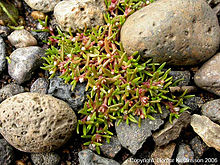| This article needs additional citations for verification. Please help improve this article by adding citations to reliable sources. Unsourced material may be challenged and removed. Find sources: "Crassula aquatica" – news · newspapers · books · scholar · JSTOR (October 2024) (Learn how and when to remove this message) |
| Water pygmyweed | |
|---|---|

| |

| |
| Crassula aquatica | |
| Scientific classification | |
| Kingdom: | Plantae |
| Clade: | Tracheophytes |
| Clade: | Angiosperms |
| Clade: | Eudicots |
| Order: | Saxifragales |
| Family: | Crassulaceae |
| Genus: | Crassula |
| Species: | C. aquatica |
| Binomial name | |
| Crassula aquatica (L.) Schönl. | |
| Synonyms | |
|
Bulliarda aquatica | |
Crassula aquatica is a succulent plant known by the common names water pygmyweed, common pygmyweed and just pigmyweed. It is an annual plant of salt marshes, vernal pools, wetlands, and other fresh to brackish water bodies. It is at least partially aquatic, living in areas which are submersed much of the time. It also lives along muddy banks and in tidally-active areas of estuaries.
Description
Crassula aquatica is a small plant forming thin mats or small patches on mud and sand, and growing more erect when exposed to open air for longer periods. The flesh of the plant is greenish-yellow to bright red or purplish. The tiny fleshy pointed leaves are only a few millimeters long.
A flower grows on a short stalk from the intersection of each oppositely-arranged pair of leaves. The flower is only about two millimeters long and wide. The fruit is a minute follicle containing several seeds.
Distribution and habitat
This plant is widespread across North America and Eurasia. It is an annual plant of salt marshes, vernal pools, wetlands, and other fresh to brackish water bodies. It is at least partially aquatic, living in areas which are submersed much of the time. It also lives along muddy banks and in tidally-active areas of estuaries.
Conservation
It is listed as a vulnerable species in Newfoundland and Labrador. Cavan Allen rediscovered Crassula aquatica in Maryland in 2012 after it had been last seen in that state in 1950.
References
- NRCS. "Crassula aquatica". PLANTS Database. United States Department of Agriculture (USDA).
Britton, N.L., and A. Brown, 1913, An illustrated flora of the northern United States, Canada and the British Possessions. 3 vols.. Provided by Kentucky Native Plant Society, New York.
- NRCS. "Crassula aquatica". PLANTS Database. United States Department of Agriculture (USDA).
- BSBI List 2007 (xls). Botanical Society of Britain and Ireland. Archived from the original (xls) on 2015-06-26. Retrieved 2014-10-17.
- "Nine Species Protected Under the Province's Endangered Species Act". Government of Newfoundland and Labrador. April 29, 2015.
- https://nmnh.typepad.com/the_plant_press/2014/03/more-than-a-pygmy-discovery.html Allen Cavan and Wesley Knapp. 2014. More Than a ‘Pygmy’ Discovery. Plant Press Vol. 17 (Number 1)
External links
| Taxon identifiers | |
|---|---|
| Crassula aquatica |
|
| Tillaea aquatica | |
This Crassulaceae-related article is a stub. You can help Misplaced Pages by expanding it. |